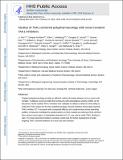Studies of TAK1-centered polypharmacology with novel covalent TAK1 inhibitors
Author(s)
Tan, Li; Gurbani, Deepak; Weisberg, Ellen L.; Jones II, Douglas S.; Rao, Suman; Singer, William D.; Bernard, Faviola M.; Mowafy, Samar; Jenney, Annie; Du, Guangyan; Nonami, Atsushi; Griffin, James D.; Lauffenburger, Douglas A; Westover, Kenneth D.; Sorger, Peter K.; Gray, Nathanael S.; ... Show more Show less
DownloadAccepted version (1.210Mb)
Terms of use
Metadata
Show full item recordAbstract
Targeted polypharmacology provides an efficient method of treating diseases such as cancer with complex, multigenic causes provided that compounds with advantageous activity profiles can be discovered. Novel covalent TAK1 inhibitors were validated in cellular contexts for their ability to inhibit the TAK1 kinase and for their polypharmacology. Several inhibitors phenocopied reported TAK1 inhibitor 5Z-7-oxozaenol with comparable efficacy and complementary kinase selectivity profiles. Compound 5 exhibited the greatest potency in RAS-mutated and wild-type RAS cell lines from various cancer types. A biotinylated derivative of 5, 27, was used to verify TAK1 binding in cells. The newly described inhibitors constitute useful tools for further development of multi-targeting TAK1-centered inhibitors for cancer and other diseases.
Date issued
2017-02Department
Massachusetts Institute of Technology. Department of Biological EngineeringJournal
Bioorganic & Medicinal Chemistry
Publisher
Elsevier BV
Citation
Tan, Li et al. "Studies of TAK1-centered polypharmacology with novel covalent TAK1 inhibitors." Bioorganic & Medicinal Chemistry 25, 4 (Febraury 2017): 1320-1328. © 2016 Elsevier Ltd
Version: Author's final manuscript
ISSN
0968-0896